Promote educational breakthrough development
Dr. Pham Van Gieng - Hanoi Pedagogical University 2 commented: Resolution No. 71/NQ-TW of the Politburo on breakthrough in education and training development was issued in the context of the country entering a new development stage, affirming that education is not only a core task but also a decisive issue for the future of the nation.
The outstanding new point compared to Resolution No. 29-NQ/TW and Conclusion No. 91-KL/TW is the shift from "fundamental and comprehensive innovation" to "strategic breakthrough", demonstrating strong political determination, directly linked to the goal of Vietnam becoming a developed, high-income country by 2045.
The Resolution has clearly pointed out the harmony between universal and elite education, for the first time emphasizing the elite factor alongside universal. This is an important shift in thinking, placing university education in the role of training highly qualified human resources and talents, while general education takes on the task of training basic human resources.
At the same time, the Resolution opens up a "new space" in which education is closely linked with science and technology, market economy , international integration and digital transformation.
Regarding the objectives, according to Dr. Pham Van Gieng, Resolution No. 71-NQ/TW makes a strong impression because of its specificity and verifiability. Vietnam sets the HDI, GII index, and the rate of 35% of students studying basic sciences - on par with advanced Asian education systems such as Korea and Singapore.
By 2030, strive to have 8 universities in the top 200 in Asia, 1 university in the top 100 in the world; by 2045, at least 5 schools in the top 100 universities in the world.
This is a visionary move, learning from the experiences of China, South Korea, and Singapore when placing universities at the center of development strategy.
Regarding solutions, Resolution No. 71-NQ/TW proposes a series of breakthrough policies: Removing institutional barriers, strongly decentralizing and delegating power, granting comprehensive autonomy to educational institutions; increasing spending on higher education to at least 3% of total state budget expenditure, overcoming the prolonged lack of investment.
In particular, the special policy for teachers with a minimum allowance of 70% is an important step to attract and retain high-quality human resources. Along with that is the policy of training talents, nurturing the elite, considering this as the driving force for the country to make a breakthrough.
The resolution emphasizes the need to build a team of teachers and school facilities, arrange enough teachers, attract excellent students to study pedagogy, and build public housing for teachers.
Along with that, instead of focusing on reforming each aspect, Resolution No. 71-NQ/TW considers education as a vital issue, deciding the future of the nation, directly linked to the national strategic goals until 2045. This is a shift from corrective reform to a creative mindset and leading national development through education.
It can be said that the breakthrough in viewpoints in Resolution No. 71-NQ/TW is a change in strategic perspective: Education not only provides knowledge but also creates the future; not only stops at the goal of equity and universality but also nurtures the elite; not only improves internally but also expands the space for comprehensive, integrated and sustainable development.
“Resolution No. 71-NQ/TW is considered one of the most groundbreaking documents ever in the field of education, paving the way for Vietnam to enter the group of developed countries.
The success of the Resolution depends on the consensus of the entire political system and society, in which the teaching staff continues to play a pioneering and decisive role in making education a key driving force for the development and longevity of the nation," said Dr. Pham Van Gieng.

Golden opportunity
Mr. Nguyen Minh Tuan - Principal of Trung Hieu Secondary School (Trung Thanh, Vinh Long) pointed out 5 breakthroughs of Resolution No. 71-NQ/TW:
Putting education and training in the national development strategy: The Resolution identifies education and training as one of the key driving forces for rapid and sustainable development of the country in the new period. This is a shift from “priority” to “strategic breakthrough”.
Focus on quality and highly qualified human resources: The Resolution emphasizes fundamental and comprehensive innovation, taking the quality, capacity and qualities of learners as the center, with special attention to high-quality human resources, digital human resources, and creative research human resources.
Breakthrough in educational autonomy: Promote university autonomy, vocational education institution autonomy, create legal corridors and mechanisms for schools to be proactive and creative.
Application of science and technology, digital transformation: View digital transformation, AI, and new technology as levers to improve the capacity of the education system.
Linking education with the labor market and socio-economic development: From "training according to ability" to "training according to social needs", closely linking schools - businesses - the State.
“These are breakthroughs because they fundamentally solve three long-standing “bottlenecks” of Vietnamese education: uneven quality, subsidized governance mechanisms, and a large gap between training and social needs,” Mr. Nguyen Minh Tuan affirmed.
Affirming the great opportunities that Resolution No. 71-NQ/TW brings to Vietnamese education, Mr. Nguyen Minh Tuan said: First of all, the Resolution elevates the status of Vietnamese education to become an open, modern, integrated education system, creating conditions for Vietnam to participate more deeply in the global labor market.
Stronger investment opportunities: The State will prioritize resources and mobilize socialization to develop infrastructure, facilities, and teaching staff.
Promote innovation in programs and methods: Put learners at the center, encourage creativity, innovation, and develop qualities and capacities.
Motivating teachers and managers: New policies on training, remuneration, and encouraging initiatives, thereby improving status and career motivation.
Promoting educational equity: Paying attention to remote areas and vulnerable groups, ensuring “no one is left behind” in accessing knowledge.

Bringing the Resolution to Life
In order for the Resolution to come into life and be truly effective, according to Mr. Nguyen Minh Tuan, we need to have synchronous and drastic solutions, specifically:
Perfecting institutions and policies: Issuing a synchronous legal framework for educational autonomy, financial mechanisms, and public-private partnership mechanisms in education and training.
Key investments: Prioritize investment in training digital human resources and key industries (AI, automation, new energy, high-tech healthcare, etc.).
Developing a team of teachers and managers: Fostering digital capacity, research capacity, modern pedagogical skills; having appropriate remuneration policies to retain talent.
Innovation in teaching, learning and assessment methods: From knowledge transfer to capacity development; from memory testing to assessment of thinking and problem-solving ability.
Promoting school-enterprise-society linkage: Linking training with labor needs, encouraging the model of "school in enterprise, enterprise in school".
Promoting digital transformation in education: National learning data system, smart classrooms, open digital learning materials, AI platforms supporting teaching and learning.
Substantive monitoring and evaluation: Avoid formalities; each agency, locality, and school must have a specific action plan, assigning responsibility to the head.
“It can be said that Resolution No. 71/NQ-TW is a golden opportunity for Vietnamese education to transform strongly; but success or failure depends largely on determination in action, synchronization in solutions, and transparency in implementation,” said Mr. Nguyen Minh Tuan.
In order for Resolution 71-NQ/TW of the Politburo to soon come into life and be effectively implemented, Mr. Dang Quoc An - Principal of Tran Nhan Tong High School (Mao Khe, Quang Ninh) proposed that there should be synchronous, drastic and practical solutions from the Central to local levels, from management agencies to each educational institution.
Firstly, concretize with clear and synchronous legal policies: Review, amend and promulgate new laws, decrees and circulars to institutionalize the contents of the Resolution, especially on financial mechanisms for non-public education, educational autonomy and accountability, specific mechanisms to attract talent, teacher salary reform, etc. This creates a transparent and solid legal corridor for the implementation process.
Second, increase budget investment and mobilize socialization: Allocate public budget effectively, prioritize breakthroughs; issue mechanisms to encourage businesses and individuals to invest in education such as credit incentives; Investment guarantees, public-private partnerships; Support non-profit private schools to access preferential loans, clean land, and cheap public services. This will solve the problem of lack of resources, promote investment in quality education.
Third, promote decentralization and give real autonomy: Give more power to educational institutions in terms of enrollment, recruitment, program development, international cooperation, and finance. At the same time, establish a transparent monitoring and inspection mechanism associated with accountability. This will stimulate initiative and creativity at each educational institution, maximizing the resources of each locality.
Fourth, develop and improve the quality of the teaching staff: Have a roadmap to reform salaries and benefits for teachers. Build a flexible system of regular training and development through online and lifelong learning. Improve the work of evaluating and classifying teachers according to their capacity and actual results.
Fifth, promote digital transformation and innovation in educational technology: Complete technological infrastructure for schools, promote digital transformation, build a national lifelong learning platform associated with a nationwide shared open learning resource warehouse. This will increase teaching and learning efficiency, personalize learning, and narrow regional gaps.
Sixth, strong communication, creating high consensus of the whole society: Strengthen communication to clearly explain the content, goals, and benefits of Resolution 71 to each citizen, teacher, student, parent, etc. This will create trust, consensus, and social pressure to speed up the implementation progress.
“It can be said that the most important solution is to change the mindset and way of working from management levels to the grassroots, shifting from administration to service, from control to support, from command to facilitation. Only when leaders at all levels are determined to implement, teachers, students and the whole society clearly understand their roles and rights and join hands, then Resolution 71-NQ/TW can truly create a breakthrough in education and training as the set goal,” Mr. Dang Quoc An emphasized.

Encourage lifelong learning
Resolution 71-NQ/TW, recently issued by the Politburo, has created a new vitality for the education sector, especially with breakthrough orientations on developing open and interconnected education and promoting the role and rights of teachers.
From the perspective of vocational education, Mr. Tran Anh Tuan - Vice President of Ho Chi Minh City Vocational Education Association expressed special interest in the new fundamental points in Resolution No. 71-NQ/TW.
Mr. Tran Anh Tuan emphasized that affirming "open education, connectivity, lifelong learning" along with specific policies for vocational education will open up great opportunities to develop highly skilled human resources.
Mr. Tuan analyzed: "This orientation allows for the legalization of credits, recognition of skills, creating conditions for vocational education to become an applied satellite, training practical engineers for research and business production ecosystems."
To realize these goals, Mr. Tuan proposed a roadmap of 10 key solutions, focusing on digital transformation and connecting the labor market. Notable among them are the development of digital vocational skill standards for trending industries (AI, electric cars, cyber security, etc.); the deployment of digital competency profiles for learners to link data with recruitment; and the piloting of a mechanism for ordering skills directly from businesses.
In particular, Mr. Tuan emphasized the need to build a digital career guidance ecosystem and a unified and public labor market information forecasting system. “Information on labor needs to be integrated into the national population database so that the connection between supply and demand is truly effective,” Mr. Tuan said.
“In order for Resolution No. 71-NQ/TW to truly come into life, it is necessary to quickly institutionalize policies on incentives, finance, autonomy, avoiding the gap between documents and practice; at the same time, build an effective monitoring mechanism, ensuring fairness and transparency in implementation. It is necessary to create a healthy educational ecosystem, connecting schools - businesses - society, and at the same time make substantial investments in teacher training colleges to attract good human resources”. - Dr. Pham Van Gieng, Hanoi National University of Education 2
Source: https://giaoducthoidai.vn/tu-doi-moi-can-ban-toan-dien-sang-phat-trien-dot-pha-post747476.html






![[Photo] Da Nang: Hundreds of people join hands to clean up a vital tourist route after storm No. 13](https://vphoto.vietnam.vn/thumb/1200x675/vietnam/resource/IMAGE/2025/11/07/1762491638903_image-3-1353-jpg.webp)

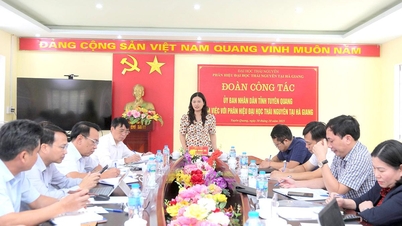

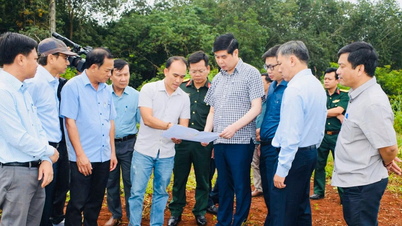

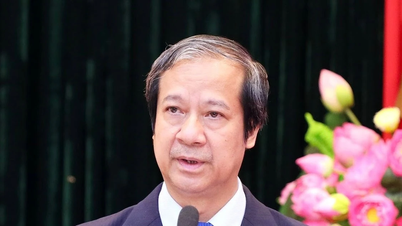
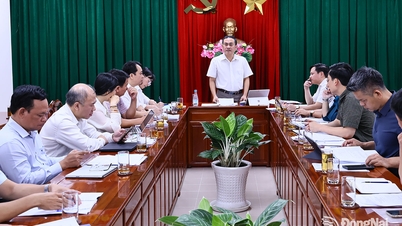

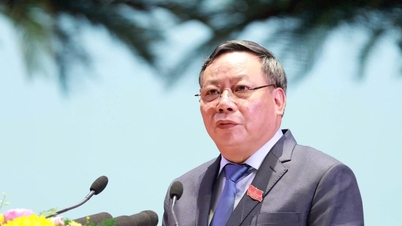

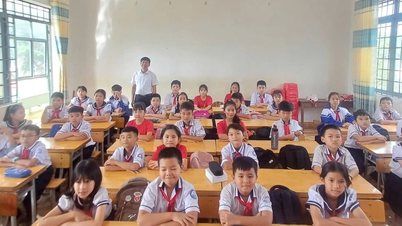





















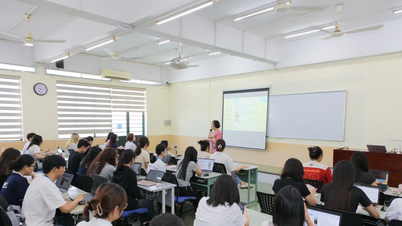




















































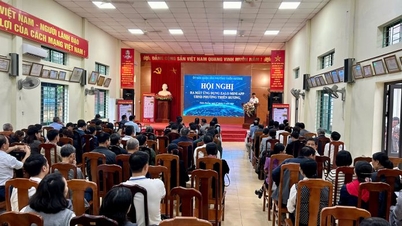






















Comment (0)